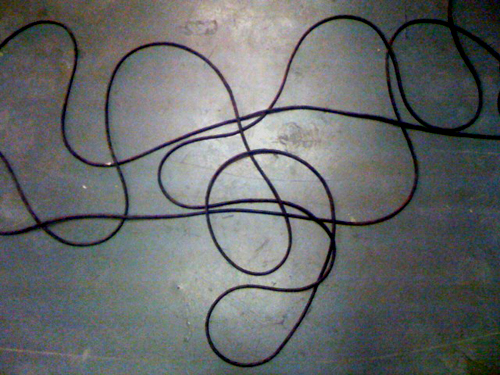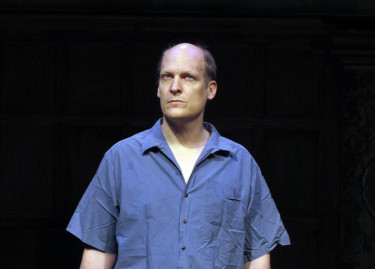Watching Jim do the performance of Sight is the Sense… last night, really loving to see him there, feeling his way, negotiating the space between himself and the audience, through the eddies, flows, loops and spirals of the text.
I even liked (in a certain way!) watching him blank and seem to lose his lines a few times, which he never once did in rehearsals. On these occaisions the longer he stood there in silence the more I began to think he was in trouble. So tricky with this kind of performance text (a long list – associative, non-narrative, slightly and confusingly repetitive) when oftentimes your ability to get from line to line rests on the place each has in the flow, and where once the flow gets broken you’re left stranded. Having some kind of intellectual/anecdotal link – a word association or stupid story to summon one line from the ending of the previous is about the best (and only) insurance policy against these stuckness situations – allowing as they do a kind of retrieval that should be possible from cold, outside the rhythmic flow of the text. In the event of the performance, even this method failed Jim at two points and he had to fish the text from his back pocket, consult it, then continue. What was very beautiful to me was seeing how well he kept his cool with this – keeping contact with the audience, taking time – pulling even the almost-rupture into a place inside the economy of his performance, making it part (somehow) of the line he was drawing in time before the spectators. No denial I guess. What is happening is what is happening.
Speaking to people about the performance I realised something I’d only half clocked before – that I really gave myself permission in this piece not to build an explicit dramaturgy in the writing. At a local level (sentence by sentence, clump of lines by clump of lines) it certainly switches things around, swapping, shifting, changing, redrawing it’s parameters. But on a broader level there are no sections, no chapters to it, no revelations of new attitude or approach, not much you could call development at all, beyond a deliberate tightening around certain topics and rhythms in the last page. (I guess there is a dramaturgy in there of course… but what there is is very flat and very fluid at the same time, a dramaturgy that arose by accident (or intuition, or habit, or process) of the writing rather than by some grand design or intention.

 Sight is the Sense that Dying People Tend to Lose First, 2008
Sight is the Sense that Dying People Tend to Lose First, 2008